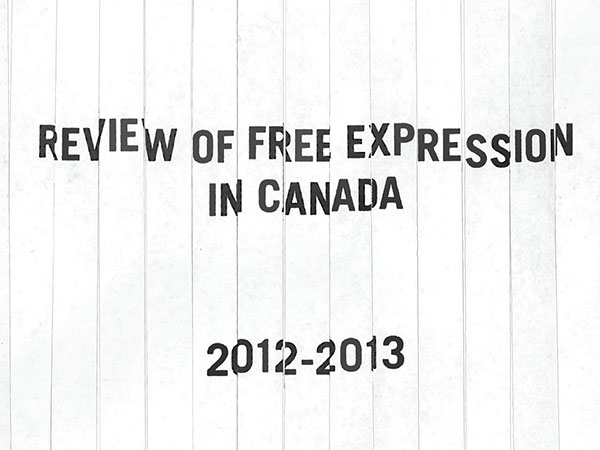In the 2013 Review of Free Expression in Canada, Canadian Journalists for Free Expression highlights a serious issue in Canada: a cult of secrecy. From the silencing of scientists to police posing as journalists to the surveillance of aboriginal activists, this pervasive issue threatens citizens’ right to free expression and undermines democratic society.
To coincide with World Press Freedom Day on May 3, CJFE is launching its annual Review of Free Expression in Canada.
In the 2013 Review of Free Expression in Canada, Canadian Journalists for Free Expression (CJFE) highlights a serious issue in Canada: a cult of secrecy. From the silencing of scientists to police posing as journalists to the surveillance of aboriginal activists, this pervasive issue threatens citizens’ right to free expression and undermines democratic society.
“We have been concerned for some time about the growing stranglehold on information available to Canadians,” says CJFE President Arnold Amber. “But when we took a look at our publication as a whole, there are so many manifestations of information control that we could see it isn’t simply a problem with our flawed and failing Access to Information Act. It is systemic. Its roots burrow across government departments and across Canada. It is a sickness debilitating our democracy.”
CJFE marks World Press Freedom Day (May 3) each year with the launch of its annual Review of Free Expression in Canada. The only publication of its kind, the Review looks at the most pressing issues of free expression in the past year, analyzes the results of major court cases and examines trends, breakthroughs and obstacles.
Experts in media law and free expression explore the cult of secrecy in the Review’s articles and signature Report Card on Free Expression in Canada. This year’s grades span the spectrum from head of the class to flunking out. The Department of Fisheries and Oceans is at the bottom with a grade of “F,” singled out for its zeal in muzzling scientists and keeping critical research findings from Canadians.
Other Report Card grades include:
• D-
for Access to Information and the federal government, whose aging Access law is ranked 55th out of 93 countries with such laws. The D- grade is a departure from the past three years, which earned F’s—after seeing small signs of improvement, CJFE is offering encouragement to the federal government in the hopes that it will heed the many voices calling for reform.
• A
for the Parliamentary Budget Office led by Kevin Page for its contribution over the past five years to the discourse in Canada about access to information, transparency and accountability of government.
• C
for the Supreme Court, for a year spent finding and sticking to the middle of the road. It broke no important new ground for free expression, and in at least one case, it missed a real opportunity to bring about much-needed change.
CJFE launched the Review of Free Expression in Canada at a special invitation-only event on May 2 at the Norman Felix Gallery, featuring emcee Anna Maria Tremonti and guest speakers Lillian Allen, Michael Healey, Franke James and Elizabeth Renzetti. The event was presented in partnership with the Canadian Commission for UNESCO. Read the live blog of the event at http://www.cjfe.org/freetospeak
The Review was made possible by the generosity of many donors, volunteers and contributors, and by the invaluable support of Ad IDEM, the Canadian Commission for UNESCO, The Globe and Mail, Juniper Park, Media Profile and TC Transcontinental.



